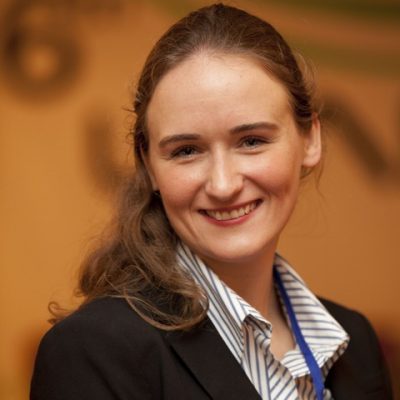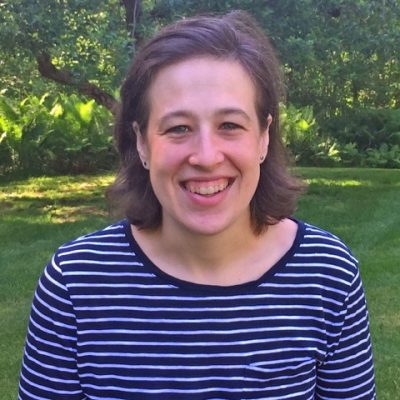Benjamin and Moore are Excellence in Ministry Scholars
Two young women whose careers as innovative leaders in the Episcopal Church are already well underway will receive CDSP’s 2016 Excellence in Ministry scholarships.
Mia Benjamin, 24, an Episcopal Service Corps (ESC) fellow in the Diocese of Massachusetts and Kathleen Moore 35, communications minister in the Diocese of Vermont, were selected for the scholarships which include full tuition and a $1,000 stipend.
Benjamin, a native of Fairfield, Connecticut and an alumna of Middlebury College, has conducted research on Christian-Muslim relations in Jordan on a Fulbright grant and developed several ministries at Grace Church in Medford, Massachusetts during her two-year tenure in the Life Together program, which is part of Episcopal Service Corps (ESC).
Moore, a native of New York City and an alumna of Kenyon College, was a television scheduler and social media manager before joining the Diocese of Vermont, where she settled because of her commitment to rural ministry. She also works with Canticle Communications, whose clients include CDSP.
“CDSP continually seeks out applicants who possess the character, leadership, and creativity that are required to lead the church in new directions,” said the Rev. Andrew Hybl, director of recruitment and admissions. “Both Mia and Kathleen embody these characteristics and more. We are excited to welcome them to CDSP this fall and witnessing their further development as leaders.”

Benjamin was 10 years old and living 60 miles from New York City when planes struck the twin towers of the World Trade Center on September 11, 2001, and the attack had an immediate effect on her. “I wanted to work on reconciling Islam and Christianity,” she said. Deeply influenced by the example of a local pastor, the Rev. Alida Ward of Greenfield Hill Congregational Church in Fairfield, she went to Middlebury assuming she’d enroll in a seminary soon afterwards.
A collegiate crisis of faith caused her to rethink that plan, but she never lost her interest in Islam or in interfaith work. With a Fulbright Research Grant, she spent a year “doing research on Muslim clerics who worked in the Jordanian government and their opinion and reactions to the women’s rights movement,” Benjamin said.
She also worked for the Jordanian Interfaith Coexistence Research Center, an interfaith organization headed by the Rev. Nabil Haddad, a Greek Melkite Catholic priest intent on improving relationships between Christians and Muslims in his country.
“We were working on a project between Jordanian Muslim military chaplains and American Christian military chaplains, trying to work on an interfaith cross-cultural exchange,” Benjamin said. “A lot of American soldiers who come to the Middle East don’t know much of anything about Islam. So how can chaplains play an important role in how to have peaceful relationships with people of different faiths?”
All the while, she was hearing a call to ministry that she “didn’t quite know what to do with.” On her return to the United States, she applied to Life Together, which, like other ESC programs, blends life in a small, intentional community, with service work with local non-profits.
“I found God again almost right away through the Eucharist and experiencing the sacraments,” Benjamin said.
In her first year in the program she began a ministry at a local nursing home, and helped convene local interfaith clergy in the wake of the fatal mass shooting at an African Methodist Episcopal Church in Charleston, South Carolina, and began a young adult evangelism program that became the focus of her second year. “I have been really focused on how we bring in young adults who either have no experience of church or who have been really hurt by church in the past,” she says.
“Mia has a quick intellect and a contagious passion in following Jesus,” said the Rev. Noah H. Evans, the rector at Grace. “She has many gifts to bring to ordained ministry, especially in a changing and more pluralistic world.
Benjamin and Moore both said CDSP’s distinctive identity as an Episcopal seminary in the ecumenical and interfaith context of the Graduate Theological Union was a key factor in their decisions to attend the seminary.
“As a relatively new Episcopalian, I am really looking forward to being part of a community that prays together,” Benjamin said. “CDSP provides an ecumenical and interfaith environment while still having community for each faith where each person could be shaped in their own identity. The communities are in dialog and I just thought that was so incredible.”

Moore has experienced firsthand the kinds of seismic cultural changes that are shaking the church in another industry: television. In her teens she became fascinated by the work of television schedulers, especially Preston Beckman, the architect of NBC’s famous “Must See TV” lineups. But no sooner had she landed a job working with Beckman at Fox, then the advent of the DVR and streaming video made it possible for everyone to be their own scheduler.
Technology closed some doors in the entertainment industry, but it opened others. A few years later, Moore was working for TheWB.com, a website that streamed programs from the defunct WB network. Only a limited number of episodes could be made available at the time, so Moore and her colleagues used nascent social media to solicit viewers’ stories about why they wanted to see a particular episode of a given show.
“It was kind of wonderful, because I could respond to what people were actually asking for,” she said. “I could say, ‘I love that story about you and that episode of Buffy the Vampire Slayer that you love, and it will be available for you to see on Monday.’ It was an incredible experience to actually be able to talk to people about things that they loved. And even back then I was thinking, ‘Oh boy should the church be excited about this.’
“That was the moment, because of the industry I was in, when I could see that one-way communication just wasn’t going to be a thing anymore. Everything was going to have to be multi-directional.”
A cradle Episcopalian, Moore was attending All Saints Church in Beverly Hills when the call to explore ordained ministry, which she’d been aware of since college, became stronger. Working in social media meant she was no longer tied to Los Angeles, and, with an interest in rural ministry rooted in childhood summers spent in Arlington, Vermont, she moved back east to a job with The Orvis Company, that she eventually left behind as she moved more deeply into the church.
“Kathleen has a real understanding that there is a need for a traditional way of being the church because there are people in our congregations who need that, but there are others who are not drawn to that or feel themselves left out, and for those people, there are new ways that have to happen,” said the Rev. Scott Neal, who was Moore’s rector at St. James, Arlington when she began her discernment process.
“The people I talk to really don’t have any impression of what it is to be Christian or a follower of Jesus,” Moore said. “It isn’t necessarily negative, which is kind of new, but it isn’t necessarily positive. It is the coolest place to start because it is scary: ‘Let me literally introduce you, for the first time in your life, to Jesus Christ.’
“I wanted a seminary that would understand that context, and was preparing people for ministry in the world as it is now and as it is going to be. I got that message more loudly and clearly from CDSP than any other seminary I talked to.”

